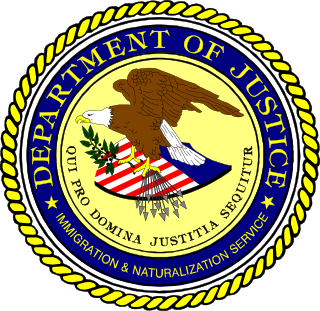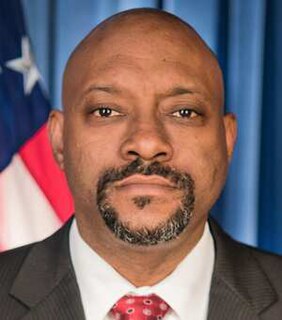
The United States Immigration and Naturalization Service (INS) was an agency of the U.S. Department of Labor from 1933 to 1940 and the U.S. Department of Justice from 1940 to 2003.
The U.S. Immigration and Customs Enforcement (ICE) is a federal law enforcement agency under the U.S. Department of Homeland Security. ICE's stated mission is to protect the United States from the cross-border crime and illegal immigration that threaten national security and public safety.

The Bureau of Alcohol, Tobacco, Firearms and Explosives (BATFE), also referred to as the ATF, is a domestic law enforcement agency within the United States Department of Justice. Its responsibilities include the investigation and prevention of federal offenses involving the unlawful use, manufacture, and possession of firearms and explosives; acts of arson and bombings; and illegal trafficking and tax evasion of alcohol and tobacco products. The ATF also regulates via licensing the sale, possession, and transportation of firearms, ammunition, and explosives in interstate commerce. Many of the ATF's activities are carried out in conjunction with task forces made up of state and local law enforcement officers, such as Project Safe Neighborhoods. The ATF operates a unique fire research laboratory in Beltsville, Maryland, where full-scale mock-ups of criminal arson can be reconstructed. The ATF has 5,082 employees and an annual budget of 1.4 billion (2020).
A special agent is an investigator or detective for a governmental or independent agency, who primarily serves in criminal investigatory positions. Additionally, many federal and state special agents operate in "criminal intelligence" based roles as well. Within the U.S. federal law enforcement system, dozens of federal agencies employ federal law enforcement officers, each with different criteria pertaining to the use of the titles Special Agent and Agent.

The United States Customs Service was an agency of the U.S. federal government that collected import tariffs and performed other selected border security duties.

United States Customs and Border Protection (CBP) is the largest federal law enforcement agency of the United States Department of Homeland Security, and is the country's primary border control organization. It is charged with regulating and facilitating international trade, collecting import duties, and enforcing U.S. regulations, including trade, customs, and immigration. CBP is one of the largest law enforcement agencies in the United States. It has a workforce of more than 45,600 federal agents and officers. It is headquartered in Washington, D.C.

The Federal Law Enforcement Training Centers (FLETC) serves as an interagency law enforcement training body for 105 United States government federal law enforcement agencies. The stated mission of FLETC is to "...train those who protect our homeland". It also provides training to state, local, campus, tribal, and international law enforcement agencies. Through the Rural Policing Institute (RPI) and the Office of State and Local Training, it provides tuition-free and low-cost training to state, local, campus and tribal law enforcement agencies.

The Commissioner of Internal Revenue is the head of the Internal Revenue Service (IRS), an agency within the United States Department of the Treasury.

The Organized Crime Drug Enforcement Task Force (OCDETF) is a federal drug enforcement program in the United States, overseen by the Attorney General and the Department of Justice. The principal mission of the OCDETF program is to identify, disrupt, and dismantle the major drug trafficking operations and tackle related crimes, such as money laundering, tax and weapon violations, and violent crime, and prosecute those primarily responsible for the nation's drug supply.

Elmer Lincoln Irey was a Postal Inspector, United States Treasury Department official and the first Chief of the Internal Revenue Service Intelligence Unit, that would later become Internal Revenue Service, Criminal Investigation (IRS-CI). Irey led the investigative unit during the federal tax evasion prosecution of Chicago mobster Al Capone.
The Interagency Border Inspection System (IBIS) is a United States computer-based system that provides the law enforcement community with files of common interest. IBIS provides access to the Federal Bureau of Investigation National Crime Information Center (NCIC) and allows its users to interface with all 50 U.S. states via the National Law Enforcement Telecommunications System (NLETS). IBIS physically resides on the Treasury Enforcement Communications System (TECS) at the U.S. Customs and Border Protection Data Center.

Internal Revenue Service, Criminal Investigation (IRS-CI) is the United States federal law enforcement agency responsible for investigating potential criminal violations of the U.S. Internal Revenue Code and related financial crimes, such as money laundering, currency violations, tax-related identity theft fraud, and terrorist financing that adversely affect tax administration. While other federal agencies also have investigative jurisdiction for money laundering and some Bank Secrecy Act violations, IRS-CI is the only federal agency that can investigate potential criminal violations of the Internal Revenue Code, in a manner intended to foster confidence in the tax system and deter violations of tax law. Criminal Investigation is a division of the Internal Revenue Service, which in turn is a bureau within the United States Department of the Treasury.
Operation Green Quest was a U.S. interagency investigative unit formed in October 2001 after the September 11 attacks. Sponsored by the United States Customs Service, it was concerned with the surveillance and interdiction of terrorist financing sources. It was disbanded in June 2003 pursuant to an agreement between the Department of Homeland Security and the Department of Justice.
The federal government of the United States empowers a wide range of law enforcement agencies to maintain law and public order related to matters affecting the country as a whole.
Law enforcement in New York City is carried out by numerous Federal, State, City and Private agencies. New York City has the highest concentration of Law Enforcement in the United States.

The Internal Revenue Service (IRS) is the revenue service for the United States federal government, which is responsible for collecting taxes and administering the Internal Revenue Code, the main body of the federal statutory tax law. It is part of the Department of the Treasury and led by the Commissioner of Internal Revenue, who is appointed to a five-year term by the President of the United States. The duties of the IRS include providing tax assistance to taxpayers; pursuing and resolving instances of erroneous or fraudulent tax filings; and overseeing various benefits programs, including the Affordable Care Act.
A law enforcement agency (LEA) is any government agency responsible for the enforcement of the laws.

The Chief, Internal Revenue Service, Criminal Investigation, abbreviated as Chief, IRS-CI or Chief, CI or simply Chief, is the head and chief executive of Internal Revenue Service, Criminal Investigation (IRS-CI), the United States' federal law enforcement agency responsible for investigating potential criminal violations of the U.S. Internal Revenue Code and related financial crimes. Criminal Investigation is a division of the Internal Revenue Service, which in turn is a bureau within the United States Department of the Treasury. The Chief is the highest ranking executive within IRS-CI and reports to the Deputy Commissioner for Services and Enforcement of the Internal Revenue Service.

The Director of the U.S. Immigration and Customs Enforcement (ICE) is a civilian official in the United States Department of Homeland Security. During July 2010 the position's title was changed from Assistant Secretary for U.S. Immigrations and Customs Enforcement.









